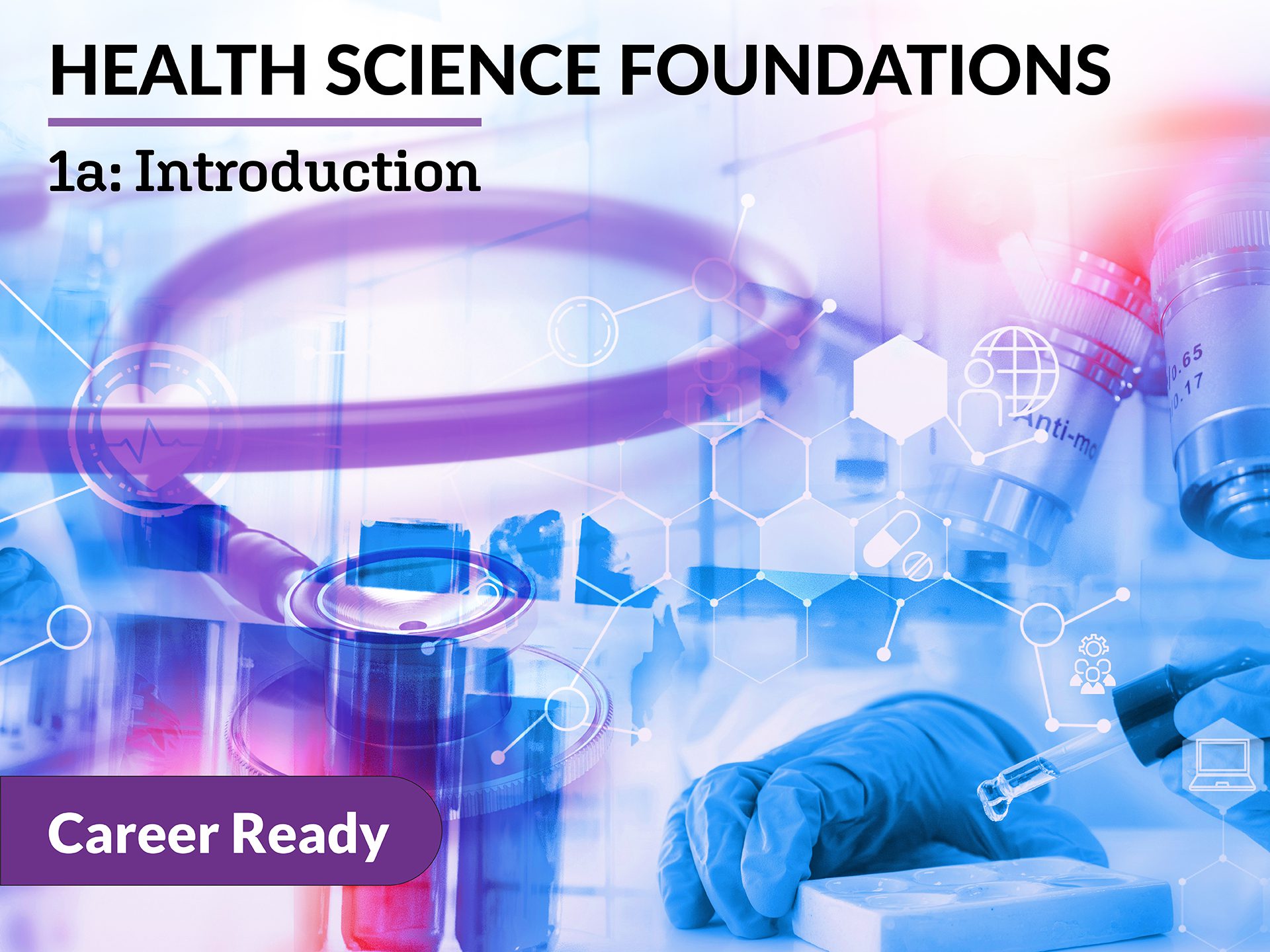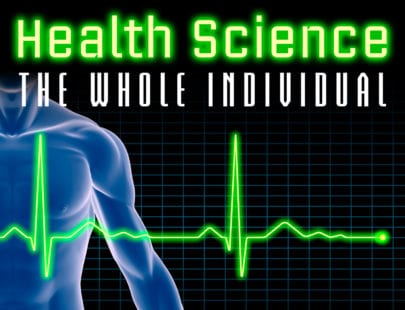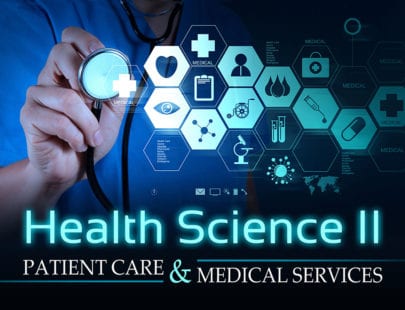
Health Science Foundations 1a: Introduction
Do you dream of a fulfilling career that allows you to help others and continually grow? Consider the on-demand field of healthcare! In this course, you’ll explore the concepts of health, wellness, and preventative care across the lifespan while also learning how the human body works. From cutting-edge technology to first-line patient care, get ready to dip your toes into the range of careers available in therapeutic services, diagnostic services, biotechnology, support services, and informatics. While learning how to apply critical skills needed by today’s healthcare provider, you’ll gain an understanding of the education and training necessary to launch your dream career!
Units at a Glance
Unit 1: Do You Want to Work in Health Care?
Are you looking to make a difference in the lives of others? Do you want a career that will provide stability while growing with you throughout your professional life? Look no further than health care! This broad field encompasses a spectrum of careers for different personalities from the empathetic extrovert who loves to help others to the detail-oriented person who enjoys crunching numbers to those who thrive in a fast-paced setting under pressure—and everyone in between! There’s truly something for everyone in the healthcare field. Here we’ll explore the variety of career options available to you as you plan your future in health care.
What will you learn in this unit?
- Compare health science careers within the diagnostic, therapeutic, health informatics, support services, and biotechnology pathways
- Describe the composition and functions of a healthcare team, including roles and responsibilities of team members
- Recognize types of health care, including complementary health practices and associated career opportunities
- Identify academic and professional requirements for healthcare careers, such as certification, licensure, registration, continuing education, and advanced degrees
- Distinguish between various healthcare environments and analyze employment trends while considering healthcare career goals
Unit 2: Health Care: A Complex System
Imagine starting a new job at an amusement park where you’ll be responsible for running roller coasters for the park’s thrill-seekers. The park is huge, so first, you look at a map to understand the lay of the land. Before you learn to operate the rides, you may also have some big-picture questions: Who is in charge of the park? Do people pay to enter the park, or do they pay per ride? Who maintains the rides’ safety? Even though the healthcare field may involve fewer thrills than an amusement park, it’s a broad and complex field that requires similar questions as you enter. Here you’ll learn your way around the field as we explore how healthcare systems are organized and regulated and how health care is delivered and paid for. Buckle up for our ride through the healthcare system!
What will you learn in this unit?
- Recognize the historical significance of health care and how it has evolved over time and across cultures
- Discuss how health care is covered and paid for worldwide
- Identify the healthcare system in the United States and its effect on individuals and the economy
- Describe the roles and responsibilities of consumers in the healthcare system
- Analyze influences on health care, including government influence
- Explain the impact of emerging issues such as technology, epidemiology, bioethics, and socioeconomics on healthcare delivery systems
Unit 3: Anatomy, Physiology, and Medical Terminology
Your patient presents with chest pain and shortness of breath. Is it an MI? Better check their BP and HR and do an EKG, stat! But before you do anything, you need to know what all those acronyms and words mean. Health care has a language all its own, and healthcare workers need to become fluent in order to communicate effectively about the human body. Here we’ll explore terminology related to the study of anatomy and physiology and the practice of medicine. We’ll also look to understand how the body functions and what happens when things get out of balance. With this foundation of knowledge, you’ll be well on your way to being a competent healthcare worker.
What will you learn in this unit?
- Define anatomy and physiology and explain the hierarchy of organization of the human body
- Describe the relationship of the body systems to one another and the overall homeostasis of the body
- Use medical terminology to communicate about the human body
- Identify the roots of medical terms and interpret abbreviations
- Discuss the importance of medical records
Unit 4: Life Stages: Growth and Development
On the day you were born, you were a small, snuggly bundle of just a few pounds, unable to see more than a few inches in front of your face and only able to stay awake for a few minutes at a time. Your only communication was through crying, and you depended on a caregiver for every need. Fast forward to today, where you may weigh over ten times what you did a birth and are likely to stay awake all day to study, game, play sports, make music, work, or spend time with friends. What changed? Here we’ll explore the social, mental, and physical changes you’ve experienced in your lifetime and look at those to come. We’ll also learn how healthcare workers can care for patients at each age and stage of life, based on their unique developmental needs.
What will you learn in this unit?
- Describe common theories of human growth and development
- Identify the growth, developmental, and healthcare needs of infants
- Distinguish the social, mental, and physical characteristics and needs of toddlers and preschoolers
- Understand the developmental changes and milestones of the school-age child and adolescent
- Recognize the psychosocial and healthcare needs of adults
- Describe the unique facets of end-of-life care and the stages of grieving
Unit 5: Health and Wellness
Over 2,000 years ago, the Roman poet Virgil said, “The greatest wealth is health.” This statement remains just as true today. While health care often focuses on healing the sick and restoring people to health, another very important part of health care is helping people to stay healthy in the first place! The concepts of health and wellness are important not just for your patients but also for you. Here we’ll learn about many aspects of wellness, including preventing disease, managing stress, and the behaviors that can keep each body system performing at its optimal function. With this knowledge, you can support your patients and care for your own most valuable asset—your health!
What will you learn in this unit?
- Distinguish between dimensions of wellness and describe strategies for the prevention of disease in each body system
- Recognize mental health as a crucial aspect of overall well-being and identify resources for mental health support
- Discuss the importance of preventive health care and how communities support health
- Compare how cultures around the world approach health and wellness
- Create a personal wellness plan
Unit 6: Effective Communication
“On a scale of 1 to 10, how would you rate your pain? Are you currently taking any medications? Do you have any allergies to medications or food?” These are just a few of the many questions healthcare providers ask their patients each day. The answers to these questions will determine the treatment plan for a patient, so clear and effective communication is crucial for getting things right. Of course, communication is so much more than just asking questions, so here we’ll explore the many aspects of communicating in a healthcare setting. We’ll look at how to overcome common communication barriers with patients and also work on developing your oral and written communication skills so you can be effective in the workplace. With this foundation of good communication, you’ll be on your way to being a trusted and respected healthcare worker.
What will you learn in this unit?
- Describe examples of effective communication using the sender-message-receiver-feedback model
- Distinguish between effective and non-effective therapeutic communication
- Overcome physical, psychological, and language barriers to communication
- Identify and record objective and subjective patient information
- Prepare oral and written reports to a professional standard
Unit 7: Health Care and the Law
If you’ve had medical care recently, it is likely that you or your caregiver had to sign some forms—or many forms. Have you ever wondered why there are so many forms? Turns out there are a lot of forms because there are a lot of laws that govern health care. Here, we’ll explore the realm where medicine and law intersect. You’ll understand your legal rights and responsibilities as a healthcare worker as well as those you have when it comes to your own health and well-being. Before long, you’ll be navigating the complexities of healthcare law like a pro!
What will you learn in this unit?
- Explain patient rights and responsibilities, including the Patient’s Bill of Rights
- Describe how to obtain informed consent and the importance of advance directives
- Identify and explain standards and applications of the Health Insurance Portability and Accountability Act (HIPAA)
- Explain the basic legal responsibilities of healthcare workers in regards to torts, malpractice, negligence, and controlled substances, among others
- Discuss applications of laws governing harassment, labor, employment, and mandatory reporting
Unit 8: Ethical Responsibilities
How would you decide who gets a hospital bed if there aren’t enough for all of the sick patients? Should someone stay on life support if they don’t have an advance directive? Should you avoid telling a patient everything about their illness if knowing the details could cause them distress? Every day, healthcare professionals face ethical dilemmas needing careful thought, including those that are life-and-death. Fortunately, each profession and healthcare institution has a code of ethics to guide workers in choosing the best and least harmful actions. Here, we’ll learn to define and navigate these healthcare ethics. Before long, you’ll be able to recognize and more confidently handle the ethical dilemmas you’ll encounter as a healthcare professional.
What will you learn in this unit?
- Distinguish between ethics, morals, and the law
- Describe a code of ethics consistent with your healthcare profession of interest
- Explain the application of organizational ethics in hospitals and other healthcare institutions
- Define bioethics and describe ethical issues that arise due to advancing medical technology
- Apply ethics to situations in the healthcare workplace
Required Materials
Physical
- Calculator
- Video recording device
Software
- Graphic design software
- Presentation software
- Word processing software
Optional
- Art supplies
- Audio recording device
- Helper
- Poster board
- Spreadsheet software



